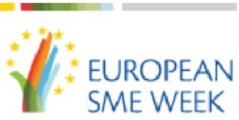 newsitems
newsitems  Turkish Elections' Legitimacy Challenged by CoE+OSCE: Bad Changes impact on Vote Results
Turkish Elections' Legitimacy Challenged by CoE+OSCE: Bad Changes impact on Vote Results
Turkish Elections' Legitimacy Challenged by CoE+OSCE: Bad Changes impact on Vote Results

*Strasbourg/Angelo Marcopolo/- The critical Findings of a joint Report adopted both by Pan-European CoE and Trans-Atlantic OSCE this Week-End, Challenge the Legitimacy of Turkish Elections, including those of 2018, on which are based the current Government and President of Turkey, also because of Last-Minute Changes impacting the Vote's Results.
Decided by slightly more than only 2% or 3%, those Presidential and Parliamentary Elections had been already accused by the EU, OSCE a.o. for UnEqual Conditions, exceptional Restrictions to Freedom of Expression and/or Assembly, under State of Emergency, etc., to which, NGOs and Medias had also added alleged "Stuffing" of Ballots, particularly in certain key areas, etc.
Now, the 61 Member States' strong (including EU Countries, Russia, Brazil, Magbreb [Algeria/Tunisia/Morocco], Korea, Brazil, Mexico and USA, i.e. 1,6 Billions of People) CoE's body of Top Legal Experts on Democracy and Human Rights through Law, known as "Venice Commission", together with OSCE's, 57 Member States strong, specialized ODHIR Office, focused mainly on "Last-Minute" Changes in Turkey's Electoral Laws, suddenly introduced by Ankara's Government on March and April 2018, i.e. shortly before the "Early" Presidential and Parliamentary Elections of June 2018.
- Even if "Venice Commission"'s Reports usually concern Future moves by the concerned States, nevertheless, in the Exceptional Circumstances of this Turkish case, they inevitably concern also that Recent Event, CoE body's Head on Elections, Pierre Garrone from Switzerland, confirmed, speaking to "Eurofora".
Significantly, the move responded to an Official Demand made by CoE Assembly's (PACE) "Monitoring" Committee, on the Honouring of Obligations and Commitments by CoE's Member States, initiated by PACE's Co-Rapporteurs on Turkey's Obligations, (Marianne Mikko from Estonia and Nigel Evans from the UK), and transmitted by that Committee's President, Sir Roger Gale, from the Governing Brittish Conservative party, with an Official Statement of the Majority of MEPs, expressing "Deep Concern", and Warning that the recent Situation in Turkey "will Impede ... genuinely Democratic Elections", so that, "the overall Legitimacy of these Elections is at Stake", asking "to Postpone" them !
- Turkey has to "Abide" by "CoE's Fundamental values, including the holding of Free and fair Elections", stressed the Statement of that key body of CoE's Assembly, from whose "Green Light" practically Depends EU's decision to hold, or Not, Pre-Accession Negotiations with a Candidate Country, which have recently been practically Stalled with Turkey, and Nowadays face even an Explicit Call inside EU Parliament to Officially "Freeze" them asap, while the Majority of EU Citizens in several Important EU Countries (including France and Germany, etc) notoriously Want to bring Ankara's controversial and unpopular EU bid to a clear End.
-----------------------------
PACE's Monitoring Committee had already expressed its "Deepest Concern", (since April 2018), for the holding of those "Early" Elections, (on June 2018), in the Conditions currently existing in Turkey.
The main Findings of the joint Report adopted Now by CoE and OSCE (comp. Supra), focus on "Amendments (which) Substantialy Change the Rules", and were "adopted ...only 1 Month prior to calling ...Snap Elections", unusually "Early" : "1,5 Years Ahead of Schedule", and "on the Same Day (that was) approved the ...Extension of the State of Emergency", as PACE's "Monitoring" Committee had already deplored previously, expressing "its Deepest Concern", both because "Changing the Election Rules 3 Months Before Election Day" "Contrary to International Standards", "in a Hasty and Non-Inclusive way", as well as since "it is Impossible to hold genuinely Democratic Elections under the State of Emergency", added even to still "on-going Security Operations in South-East Turkey"'s predominantly Kurdish population regions.
- "Serious Questions" are raised, on "several" of these Last-Minute Changes of Rules, "about Election Security, Transparency and possible Interference of the Executive" in those Votes, PACE's Committee had Warned, pointing, f.ex., on "the possible presence of Police forces in polling Stations, which could have a Deterrent effect on Voters", and on "the decision to Accept Non-Stamped Ballot Papers", which risks Stuffing Ballots, etc.
- Already, such "Late Amendments" to Electoral Law (Comp. Supra) "raise 4 Concerns" : 1) They "may Undermine ... a Fair and Stable Framework ... providing... an Equal playing ground". 2) "In particular, if they are Rushed, may be Detrimental to an ...Inclusive ...process". 3) "Might be perceived, ...as politically Biased, that is as Intended to (Dis)Advantage some Political Parties and Candidates", "Undermining Trust" in such Elections. 4) "Diminish the opportunity... to become Informed, ...and Limit the needed Time for ... Preparations, including (administrative) Training and Voter Education". CoE and OSCE point out.
- Such Late Changes were normaly Excluded by the Turkish Constitution, (which required at least "1 Year" before the Elections), but this was Modified in the 2017 Constitutional Reform. However, even the latest's, Shorter Time "Deadline" : "6 Months", was "Significantly Exceeded" by those March-April 2018 Changes to June 2018 Elections...
- This became a fortiori problematic since Many of those "Late Amendments" touched upon "Fundamental Elements of the Electoral System", provoking "particular Concern", CoE and OSCE critically observe :
1) "One" was the "Introduction" of Parties' "Alliances ... in relation to the 10% Electoral Threshold", "very High in Turkey", which "regulates the Transformation of Votes into Seats", and "Impacts a Fundamental Element" : "At the (Late) Time of its Adoption it was Clear ... that this ... could have a Significant Impact on the Electoral Results", and, "indeed", it had "a Direct Impact, ...as it Allowed the junior Partner in the (Nationalist) Opposition Coalition, the (New) <<Good Party Iyi>>, to Meet the Threshold and thus be Represented in Parliament", (while, on the Contrary, the pro-Peace and Democracy, pro-Kurdish "HDP" Party, was attributed Less MPs than otherwise expected).
Moreover, that exceptionally High 10% Threshold had been, in the Past, tolerated in the case of Turkey, mainly on the Pretext to form "Stable" Governments, but Now, after the recent Introduction of a Presidential regime where it's the President who forms any Government (2017), there is "No longer" any "major Justification" for that, and it should be "Reconsidered", CoE and OSCE found.
2) Those "Amendments" also "Changed the Composition and Leadership of the Ballot Box Committees", "by Introducing (Government-Controlled) Civil Servants", including for their "President"; "while, Previously, (only) Party-Nominees were BBC Presidents". Another "Fundamental" point. Particularly when, "due to the perceived Lack of Independence of Turkey's Civil Service from the Political Powers, it's Hard to see how ...BBCs can be considered Impartial, as Required by the Code of Good Practice in Electoral Manners".
In Addition the Turkish Supreme Board of Elections (SBE), ("a Powerful State Organ, which, in addition to Organising elections, also makes final Decisions in electoral Disputes and on the electoral Result, withOut possibility of judicial Review"), and is composed mainly by "Judges", became "Extremely Problematic" on "Independence" after the 2017 "Constitutional Reform" which allows the Turkish President to Control Judges and Prosecutors Directly and/or via its Parliamentary Majority, CoE and OSCE found.
3) Evenmore, "Several Important Safeguards, for Transparency and ...Security, were Affected by the ... Amendments..., which may Undermine the Integrity of Elections". F. ex. :
- "Allowing Ballots that have Not been Stamped by the BBCs to be considered Valid".
"This increases the Risk of Ballot (or Envelope) Stuffing", the Report Denounces. Indeed, "Other safeguard Measures, such as the WaterMark on Ballots, ... are Not a Guarantee that it wasn't Brought in from Outside the Polling Station", and "this Undermines the Voters' Right to an Accurae Assessments of the Ballot's Results". On the Contrary, "Stamping the Ballots or Envelopes is ... a Safeguard that a person is Not able to put More than 1 Ballot into the Ballot Box simultaneously, by Ensuring that Additional Ballots canNot be Brought into a Polling Station". But the Turkish Amendments "do Not ... establish a Procedure", neither "Clear and Objective Criteria" on "Whether an "UnStamped Ballot was ...due to Negligence, or ...Fraud, leaving room for Arbitrary application".
Indeed, alleged "Widespread Stuffing", (mainly in favour of pro-Government Extremist "MHP" Party), impacted these Turkish Elections, particularly in the South-East, also according to Data cited in a "Washington Post" Article, as reported by a reference noted by "Wikipedia", among others.
- "The possibilities" :
* "for (Central Government-Controlled)) Governors and Presidents of provincial Electoral Boards (Comp Supra) to request Moving or merging Polling Stations", under "Security" pretexts.
This "raises additional Concerns about ImPartiality", CoE and OSCE Warned, considering also that this "Legislation does Not include Strict, Clear, Objective Parameters for its application", speaking Only about "Security", with a "Wide Margin of Appreciation, which could be Abused, and Lacks Transparency". "ReLocation of a Polling Station may make it Difficult for Voters to exercice their Rights", and it "was Extensively Used in the 2018 Elections", triggering "Claims" that it "Limited Access to the Vote of the Kurdish Population", while "Numerous formal Complaints were lodged".
* even "for Voters living in the Same Building Address, to be assigned to Different Polling Stations";
Turkish "Authorities" claimed that it "protected the Secrecy of Vote", but Others "were Concerned that" this "allowed Fraudulent Voting ...(e.g. Deceased Votes to be Registered)" and a "Difficulty for Parties, Voters and Observers to Control the Voting Lists", in Addition to "the Distance of Voters from Polling Stations".
* as well as for "the SBE to Determine the Number of Voters per Polling Station", which is "No Longer" Fixed by Law :
A "Discretion" which "may lead to OverCrouding or Discrepancies between Polling Stations, Denying in practice the Right to Vote in some areas" : F.ex., "give Advantages to Majority political parties if More polling Stations are set up in the regions with wider Support for them, while Fewer polling stations are set up in regions where the support is wider among Opposition parties", etc. "Moreover, Voters should be Informed, well in Advance", and "Distance and Transport means ...considered". CoE and OSCE are for "Equality in the Size of Polling Stations", with "a Maximum Number of Voters" to be provided by Law.
* and for "Any Voter to request Law-Enforcement presence in Polling Stations", ("in Violation" of International Standards); as well as the "Increased Access for Law-Enforcement Personnel to Buildings housing Polling Stations"; But this may "Disrupt the Voting process by repeated and Unwarranted calls for Security Forces", while "a high level of Unreasoned presence of Police officers in the Polling Stations could Hamper a smooth Voting free from Intimidation", CoE and OSCE Warned.
A fortiori when Amendments also "Restrict" the "Ballot Box Area" only "to the <<Room, Section or Place>> in which a Ballot Box is placed", while, "Before" that, BBArea "also Included a 100 metre Radius Around the Polling Station" : But, by "Narrowing the BBArea", this "also" Extends a possible "presence of Security Forces", "Allowing" it even "in the immediate Vicinity of the Polling Station, including in Hallways of the Buildings that House" them, "where Voters are Queuing", and this "could have an Intimidating effect".
* "the Introduction of Mobile Ballot Boxes", (officially due to help Handicaped persons,"unable to be physically present at Polling Stations"), "should" be placed "under Strict Conditions, Avoiding all Risks of Fraud", according to International Standards, and "defined ... in the Legislation, to provide ...Stabiity, ...Predictability; ...Transparency and ...Trust", the Report found.
(Etc.+)
- "Adding to (CoE + OSCE's) Concerns"; such "Amendments were adopted in a Hasty manner, withOut proper Consultation ..(of) the opposition Parties and Civil Society", "moreover made in a State of Emergency, Limiting ...Democratic Debate and the Free Expression of a Plurality of Views", despite the fact that they "may have Significant Consequences for the exercice iof Suffrage Rights" and "the Electoral Result".
=> In Consequence, "Taken Together", all those Late and "Significant Amendments" (Comp. Supra), "their Timing and Process",
(added to the pre-existing Lack of Judicial Review of the decisions of the Supreme Board of Elections [SBE],including on Final Election Results", and to a "system of Seat Allocation to Constituencies, which results in a significant Differential in the Number of Votes per parliamentary seat, ... Inconsistent with ... Equality of the vote"),
=> "Challenge the Legitimacy of Turkish Electoral legislation", CoE and OSCE concluded.
-------------
+ All these Findings are Added, according to CoE Assembly's "Monitoring" Committee's earlier official Statement mentioned above (Comp. Supra), also to the well Known Fact that "the State of Emergency has, since July 2016, led to Disproportional measures and Unacceptable Restrictions of fundamental Freedoms - in particular freedom of Expression, Media, and Assembly. It has Affected Negatively and disproportionally Oppositional and critical Voices", while "No Progress was achieved since then" : A significant number of Parliamentarians from the opposition (10), Journalists (about 150) and Human Rights Defenders remain in Detention, while Many Other face legal cases on Terror-related Charges. Many NGOs were Closed down. Numerous Media have also been Closed down, or Bought up by pro-Government businessmen. A newly adopted Law has Tightened the control of On-Line broadcasting", (etc).
- Even "Repeated" previous Denonciations, by CoE's Assembly and CoE's Anti-Corruption Watchdog "GRECO", related to "Media Coverage, and Funding of Electoral Campaigns and Political Parties" in Turkey, still remain "UnAdressed", "Regretted" PACE's Monitoring Committee.
-----------------
=> That's why PACE's Monitoring Committee's official Call to "Postpone" those Turkish Elections (Comp. Supra) had been adopted already as Early as since April 2018, i.e. 2,5 Months Before the Date Scheduled for the controversial Votes of 24 June 2018, and it's obviously in order to Support this move, that MEPs had asked CoE's "Venice Commission" Top Legal Experts to examine also those Last-Minute Changes to Turkey's Electoral Law, (f.ex. at their Meeting of 21-22 June 2018).
>>> But, curiously, "Venice Commission"s reaction was Delayed, for unknown yet reasons or pretexts, (particularly in order to Publish the Full Text of its Report), up to ... 17 December 2018 !
However, this CoE's latest Critical Publication almost Coincides with a renewed outbreak of Turkish Government's threats against Syrian Kurds (EU + USA's Allies against ISIS' Islamist Terrorists cowardly Targetting even Civilian People), provocations vis a vis Cyprus and Greece, Interferences in France's internal affairs, and a Trend to Augment the Number of Irregular Migrants/Mass Asylum Seekers send to Europe by Turkish Smugglers, (despite more than 3 Billions € wasted by the EU in a controversial attempt to convince Ankara to prevent that), which are Raising EU, USA's and Other Countries' Concerns.
Meanwhile, the Dates for the Next CoE Assembly's Plenary Session, on January 2019, and for EU Parliament's debate and vote on a New (and more Critical) Report on Turkey's controversial and unpopular EU bid, shortly Before the forthcoming May 2019 European Elections, are Approaching.
----------------------------------
***
(NDLR : "DraftNews", as already send, Earlier, to "Eurofora"'s Subscribers/Donors. A more accurate, full Final Version, might be Published asap).
Main Menu
Haupt Press Deontology/Ethics 2009 Innovation Year EU endorses EuroFora's idea Multi-Lingual FORUM Subscribers/Donors Häufig gestellte Fragen Die Elxis Lizenz Erweiterte Suche EuroFora supports Seabird newsitems In Brief European Headquarters' MAPs CoE Journalists Protection PlatformBRIEF NEWS
- 00:00 - 02.06.2021
- 00:00 - 18.10.2020
- 00:00 - 19.06.2020
- 00:00 - 18.05.2020
- 00:00 - 20.04.2020
- 00:00 - 02.02.2020
- 00:00 - 09.12.2019
- 00:00 - 27.11.2019
- 00:00 - 16.11.2019
Popular
- Yes, we could have prevented Ferguson riots says World Democracy Forum's Young American NGO to ERFRA
- Spanish People Elect CenterRIGHT Majority with 1st Party and Total of 178 MPs (6 More than the Left)
- Pflimlin's vision
- The European Athletic "Dream Team", after Barcelona 2010 Sport Championship Results
- Source Conseil d'Europe à ERFRA: Debatre Liberté d'Opposants à Loi livrant Mariage+Enfants à Homos ?
- Head of BioEthics InterGroup, MEP Peter Liese : "Embryonic stem cell research reaching its END" !?
- Spain: Jailed Turkish Terror suspect with Explosive,Drones,Chechen accomplices stirs Merah+ Burgas ?
- UN Head Ban Ki Moon at CoE World Democracy Forum : - "Listen to the People !"
Latest News
- EUOmbudsmen Conference 2022: Digital Gaps affect People's Trust threaten EF Project on EU Future ?
- French Election : Black Out on Virus, but Obligation for Fake 'Vaccines" Challenged
- Both French Presidential Candidates point at "Humanism" in crucial times...
- France : Zemmour = Outsider may become Game Changer in Presidential + Parliamentary Elections 2022
- PACE President Cox skips Turkey Worst (Occupation) case compared to Russia (DeMilitarisation) query
Statistics
Besucher: 56812516Archive
Login Form
Other Menu
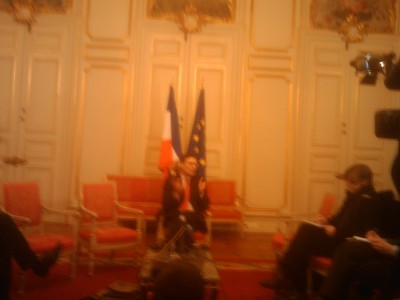
It's important to create a synergy between "mutually stimulating" EU Countries' moves in order to overcome an "Unjust" Crisis "imported from USA", stressed new French Minister for Economic Revival, Patrick Devedjian, in Strasbourg, warning also that, while hoping for a vigorous Obama US Plan, nevertheless, "Time" is of essence for Europe...
In fact, it's EU's own interest to act Fast, before June 2009 EU Election, since, with Lisbon Treaty not ratified yet, it cannot face again the risk of a Majority Abstention, as back in 1999 and 2004, nor another "anti-EU" mood among Citizens, as in the 2005 French and Dutch "No", followed by the 2008 Irish "No", without endangering rare Historic opportunities, currently open for the EU, whose future is at stake.
From Social issues up to High-Tech Scientific Research, concrete action for Economic revival started from Strasbourg and its European dimension, for the new super-Minister Patrick Devedjian, who visited a Popular Social Housing and Infrastructure project at nearby Hagenau village, before meeting new leaders of Strasbourg's unified mega-University in a Scientific Labo at the Campus, close to EU Parliament and CoE headquarters.
Devedjian, who met also with all the spectrum of Local Political deciders of Alsace region, close to FrancoGerman borders, wants for deeds to meet the words, in real practice, whenever politicians speak about Strasbourg and Europe's development.
-------------------------------
Devedjan to "EuroFora" : "European coordination can act as a multiplicator by mutual stimulations"
--------------------------------
Devedjian was questioned by "Euro-Fora" on his expectations for reciprocal effects of coordinated European plans :
- "We are living in a (European and Global) system where borders are transparent : When we take measures in France, they produce effects also in Germany, in Belgium, Italy, Spain, or other EU countries, and vice-versa. "So, we can have mutually stimulating effects between national revival Plans, if they are somehow coordinated", ..."They can augment each other's effects, acting as multiplicators and levers". "As a State stimulates Local authorities and Private business, similarly, each EU country's economic revival plan may multiply the effects of other EU countries' actions", he told us.
- "F.ex., when I visited Strasbourg University's Scientific labos, they told me that part of the renovation, funded by France, is realized by German companies located only a few Kms away from the border. Thus, the French revival plan benefits also the German economy. And vice-versa : when Germany takes certain measures, they can have beneficial effects also for French companies"
In an era of Globalisation, "nobody can close and isolate himself inside a Fish-Bowl !", he concluded.
----------------------------------
Economy's revival starts from Strasbourg and Europe, for new French Minister Devedjian
----------------------------------
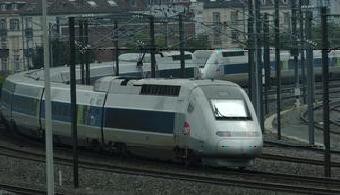
This could be one of the reasons for which the new French Minister for Economic Stimulus chose to make his 1st visit to Strasbourg, the headquarters of European and Paneuropean Institutions, in the Franco-German river borders at the heart of Europe.
- "It was President Sarkozy's idea", he revealed, adding also fresh "support to Strasbourg's European vocation, not only with words, but also with deeds" :F.ex., the completion of a High-Speed Train network, due to stimulate fast links with Germany, Austria, Italy, Hungary and other central EU Countries.
- "This Crisis is Unjust for Europe, because it wasn't its fault". The greatest part of the "Crisis was imported from the USA, where problems are deeper than here'', in the EU. The Crisis "wasn't due to a bad managment by Europe", who was affected by problems which emerged elsewhere. That's why Europe must be united and active enough to face this challenge. said Devedjian, who has just won +5% in popularity...
- "I hope that there will be an "Obama-effect" also on Economy, and that the Plan of the New American President will be substantial enough to face this crisis, which is worse in the USA than in our area", Europe, he added.
"Economic Revival overcomes political divisions : F.ex. Strasbourg's Socialist Mayor "Ries agreed that State actions funded by Public Debt are justified during such exceptional circumstances", noted the Center-Right republican Minister.
---------------
"Zeitnot" for 2009 EU Elections ?
--------------------

"My problem is Time", stressed Devedjian from the outset, at Strasbourg's University. "I have to engage 75% of funds in 2009, out of a total of 29 Billion euros", he explained later. "Monitoring will be of essence", because we must "avoid bureaucracy or delays. No project should get lost or neglected in complex meanders of adminstrative offices' moving sands", he warned.
- "I must create activities in the middle of the Crisis", he added. Questioned by EuroFora whether he aims to start creating some "hopes before the June 2009 EU Elections", Devedjian, a former leader of the Governing Political Party in France: UMP, did not immediately reply, but revealed, later, that he "hoped to start at least some Projects on May 2009, even if the bulk of Revival Plan's effects are "expected from Autumn 2009".
However, with only 30% of EU Citizens currently aiming to cast a vote at the forthcoming EU Elections on June, (See other NewStory), the coordinated moves' results are expected to be crucial for Citizens' participation and votes at the forthcoming June 2009 EU Elections throughout all 27 EU Member Countries...Thus, it's vital for all Europe's own Future that coordinated national Economic revival plans start to have concrete results and create hopes for new dynamics before the June 2009 EU Election...
A real challenge, since careful choices are needed : Our aim is to fund projects which "create activities", even "in the middle of the crisis", and have a "lever effect, attracting other investments", Devedjian said. Because the "Stimulus' Plan has 2 aims : A Tactical one : to create New Activities. And a Strategic one : Choose what can become efficient and useful also in the Long-term".
- "Are you ready ?", he asked Strasbourg University's new President, professor Alain Beretz, with some 700 million euros in his pockets for Education-Research in France. - "We are !", he replied.
- "The Minister's initiative can accelerate funds, and Time is important for us. This concerns the entire renovation of all our buildings", said to "EuroFora" President, Beretz. "I showed some Scientific Research Labos to Mr. Devedjian. But, If we had more time, I could show him also some Education Amphis, whose condition needs to meet Strasbourg's new Mega-University's ambition" to reach the 10 best in the World, as Prime Minister Fillon earlier anounced here.

(Devedjian kicks off his Economic Revival tour from Strasbourg University, meeting with its new chairman Beretz, at Scientific Institute Le Bel)
-----
Regional Prefectures should gather and select projects to be presented for decision before the end of January 2009.
A well-known close friend of President Sarkozy, who succeeded as EU Chairman to launch, in agreement with German chancelor Merkel and even British prime minister Brown, vigorous EU actions against the Financial/Economic Crisis, (starting from the 1st Historic Summit of EuroZone's Heads of State/Government, October 12 at Elysee Palace, followed by Washington G20 Global Summit), Devedjan will have a key role in the realisation of National and EU plans recently agreed in Brussels.
President Sarkozy is expected to arrive himself in Strasbourg, on the occasion of the official inauguration of its brand New Mega-Hospital, on the 9th of January 2009, at the eve of EU Parliament's session here, Elysee confirmed shortly after Devedjian's visit.
EU is due to review its economic revival plans at March 2009 EU Council in Prague, before the April 2 London Global Summit.
***
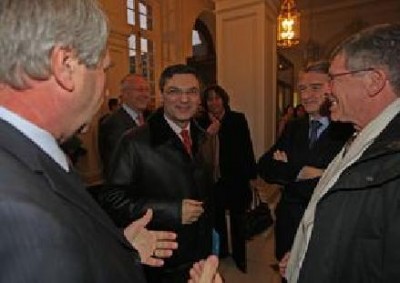
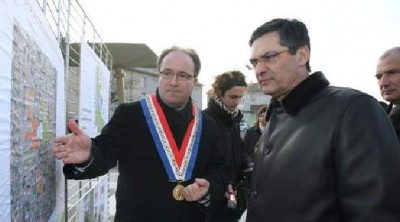
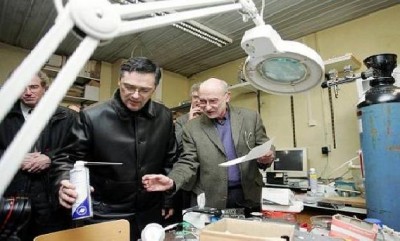
Multi-facet concrete activities at focus : Stimulus Minister Devedjian at the Political, Social and High-Tech fronts in Strasbourg...
Polls
SMF Recent Topics SA
- Record Hospitalisati... (0) durch Breadman
- How Many Infected by... (1) durch Thunderbird
- Real Cause for Europ... (0) durch Breadman
- Interesting Australi... (0) durch Aurora
- Plus de mRNA Faux-&q... (0) durch Aurora
- EU: Lukashenko as E... (0) durch WKalina
- Why NATO in Ukraine,... (0) durch Geopol
- Afghanistan's key : ... (0) durch Thunderbird
- Anti-Pass Demonstrat... (0) durch Aurora
- Veran - Fioraso : Mê... (1) durch JohnsonE













